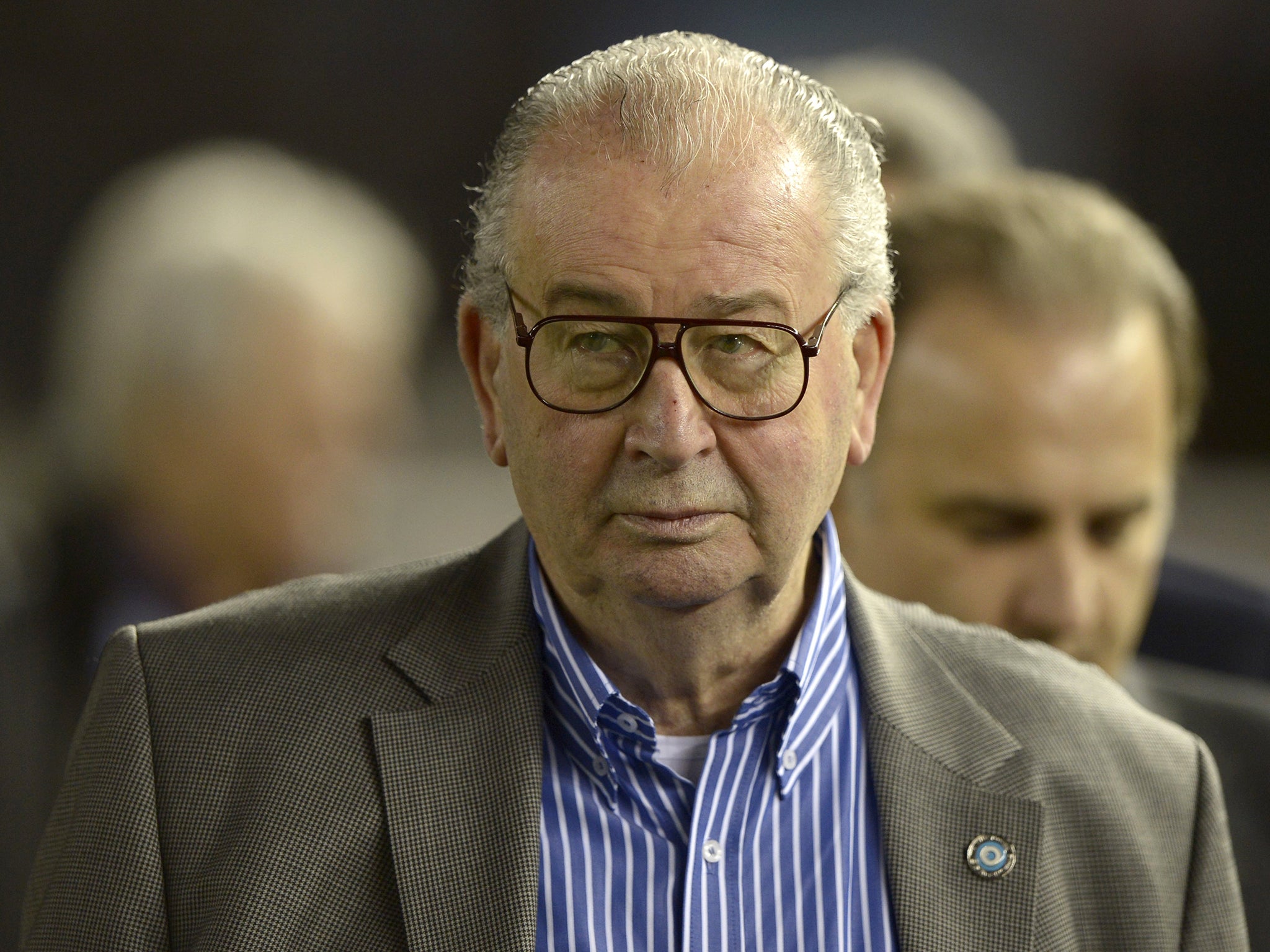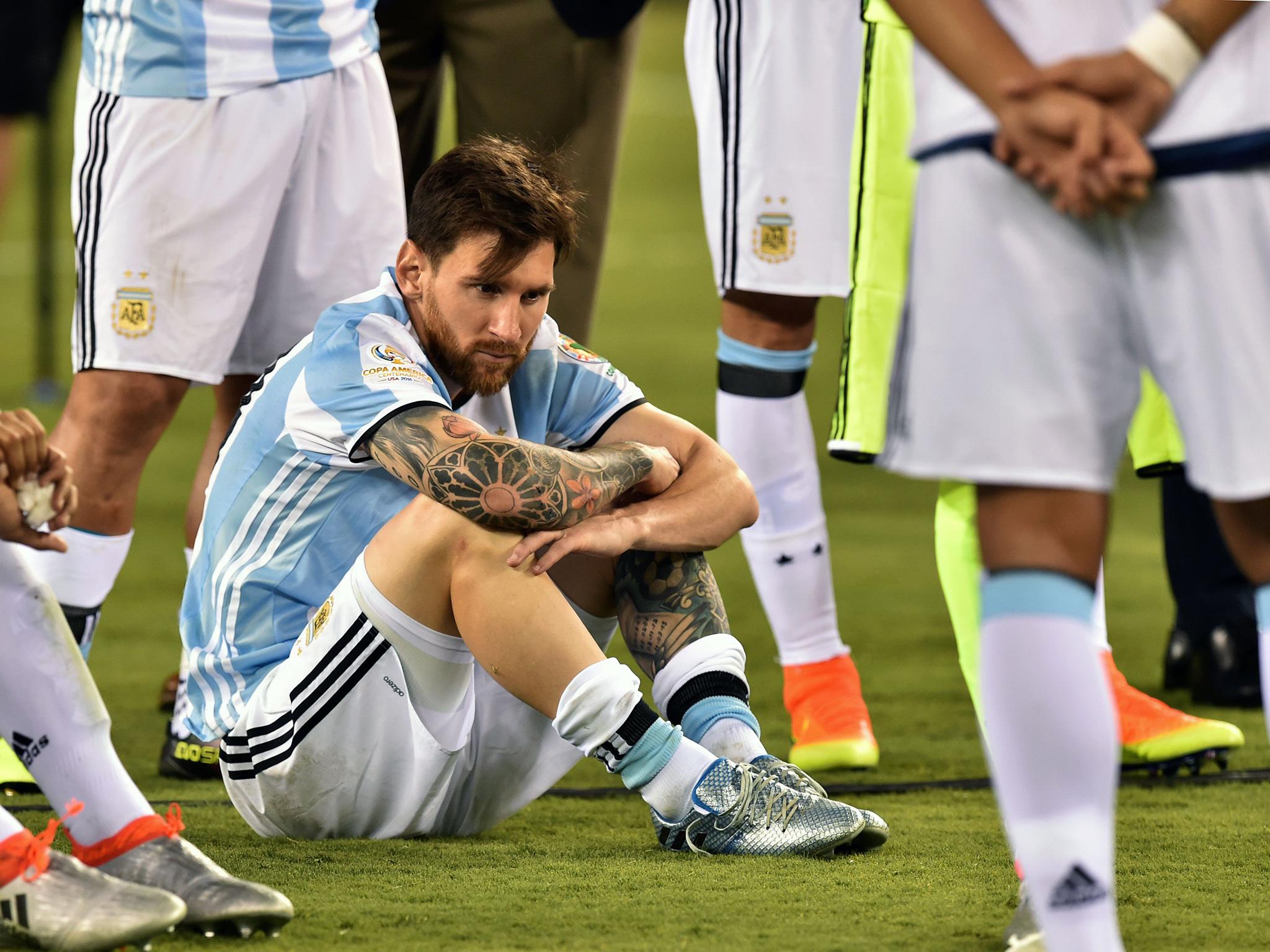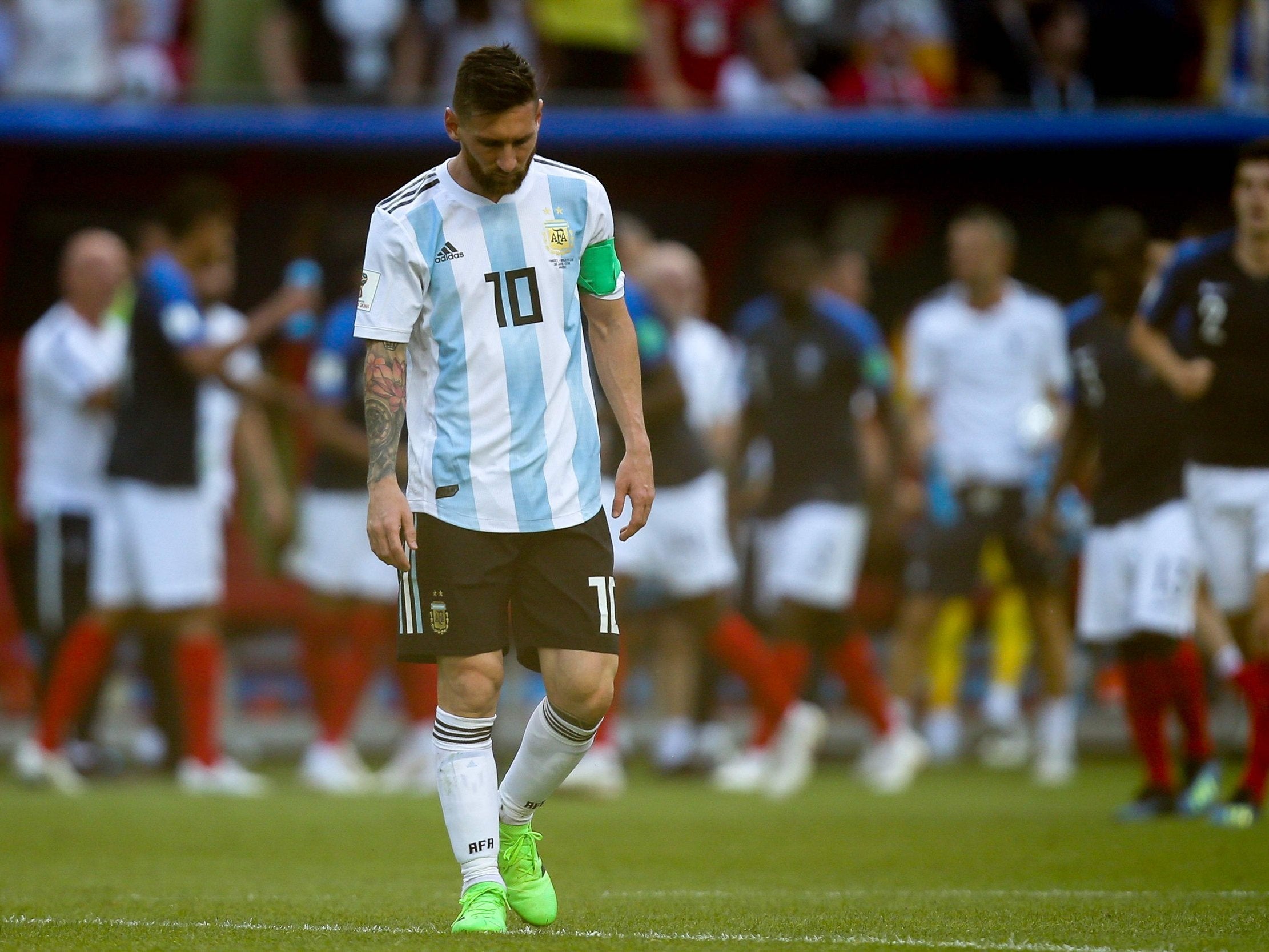Why Argentina’s road to World Cup failure is long, complicated and paved with greed and corruption
Long read: To understand Argentina's failure on the field, if it even was that, you need to comprehend the utter dysfunction those players had to overcome to get this far

Your support helps us to tell the story
From reproductive rights to climate change to Big Tech, The Independent is on the ground when the story is developing. Whether it's investigating the financials of Elon Musk's pro-Trump PAC or producing our latest documentary, 'The A Word', which shines a light on the American women fighting for reproductive rights, we know how important it is to parse out the facts from the messaging.
At such a critical moment in US history, we need reporters on the ground. Your donation allows us to keep sending journalists to speak to both sides of the story.
The Independent is trusted by Americans across the entire political spectrum. And unlike many other quality news outlets, we choose not to lock Americans out of our reporting and analysis with paywalls. We believe quality journalism should be available to everyone, paid for by those who can afford it.
Your support makes all the difference."Jorge Sampaoli was not the sickness, he is merely a symptom."
Sebastian Fest's line in La Nación on the day of Argentina's World Cup 2018 elimination this weekend was so starkly poignant because it gets straight to the crux of the matter, cutting through every excuse offered and pointing straight to the institutional rot that is fundamentally to blame for Argentina's ills.
That bumpy road that ended in Kazan, Russia, in the baking summer of 2018 is our current waypoint but this path truly began all the way back in the mid-winter of Buenos Aires, Argentina, in 1978 on the day that the Albiceleste won their first-ever World Cup.
Stood on the pitch at the Monumental as the host nation’s captain, Daniel Passarella, lifted the trophy, was a rising star in the Argentinean FA, Julio Grondona. Within a year he had been elected president of the association but little did this country know - still cheered from a World Cup win which history has remembered less fondly - that from this point nearly 40 years of corruption would take hold or the devastating effect it would eventually have on their beloved national game.
To understand the successes and failures of the Argentina team, they must be viewed in the context of their team’s governing body, an organisation for so long one of the most corrupt in the game and in recent times, floundering since the death of Grondona, simply one of the most inept. It is a stain on a great country that he was in power for so long, acting with virtual impunity - but it is the ultimate disgrace that only his utterly corrupt direction of their FA could actually keep things going, as evidenced by the shambles ever since.
Take Argentina’s failure at this World Cup; a mix of disastrous preparation, pitiful resources (both financial and human, in certain positions) and mismanagement.
That is the AFA all over, and there is little sign that it will improve going forward even if Lionel Messi stuns the world and decides not to retire from international football a second time.
In having one of the oldest squads at the tournament, Argentina exposed what the destruction of their youth pipeline might mean for their future.
Argentina won the Under-20 World Cup in 2001, 2005 and 2007. 20 players featured for Argentina at the 2018 World Cup and seven of those were Under-20 World Cup winners from 11 or 13 years previously. Of their last three U20 World Cup squads (2011, 2015, 2017) only two players featured in Russia, evidence of a pipeline that dried of talent and eventually broke, with no system in place to champion or develop the youth players and no clear direction at the top had they even got there.
Argentina’s ‘Golden Generation’ should really be defined, then, as between 2010 and 2016, when those 2005 and 2007 winners matured towards their peak. Look at the teams that won major tournaments in the period, though, and they were mainly those with a clear long-term plan - Spain 2010 and 2012, Uruguay 2011, Germany 2014 and Chile in 2015 and 2016 - which highlights the lack of one from the AFA. It highlights their failure to maximise talent (the result) on top of the current failure of not developing it (the process).
Their preparation for this summer's World Cup was shambolic, the worst of any team until Spain came along, asked Argentina to hold their cerveza, and sacked Julen Lopetegui the day before Russia 2018 kicked off.
It began when the Albiceleste were struggling to qualify until they begged Lionel Messi to reverse his international retirement and the Barcelona man dragged them kicking and screaming to Russia.

That win over Ecuador that sealed qualification should have been the turning point for Jorge Sampaoli, who had until that point been forced to take a pragmatic role that was the opposite of how he had achieved all the success in his career. Argentina would have six friendlies across three international breaks in which Sampaoli could work out the best way to implement his favoured system and take Argentina to success.
But having used 48 players in his first 10 games, the confusion over personnel never really went away and the friendlies that took place were disastrous - including heavy defeats to Nigeria and Spain - as well as two cancelled games on the eve of the tournament against Nicaragua and Israel.
Argentina’s only pre-World Cup friendly in the end was against Haiti (world ranking: 104) after negotiations over playing a Spanish club side failed in the wake of the Israel friendly being cancelled . That trip to Jerusalem didn’t go ahead because the players weren’t willing to travel over humanitarian and security concerns and was symbolic of their problems - something organised by the AFA for money-spinning purposes that completely backfired.
In the past few years Argentina have been paraded around the world like a travelling circus for international friendlies, the AFA ready to take offers from the highest bidder for games as long as they could guarantee Messi would feature. It has meant such lamentable moments as ‘Guinness The Match’ - a friendly in Nigeria that anyone watching could tell immediately was fixed and was subsequently deemed so by Fifa - as well as games in far-flung places like Bangladesh, India and Australia.
That they needed the money comes back to Grondona, a man who essentially stole tens of millions of dollars that was destined for the development of the game in Argentina and possibly even hundreds of millions. A former Swiss banker, Jorge Luis Arzuaga, admitted in a case brought by the US Department of Justice to channelling $25m (£19m) in bribes to Grondona in return for helping his client, TyC, secure television rights deals and that was only from 2010 onwards. Who knows what Grondona’s true bank balance was but it probably resembled a telephone number, an affront to a nation when the AFA’s main reason for not being able to simply do away with Jorge Sampaoli after this latest humiliation is that they can’t afford to pay off his contract, and that they would need him to step down.

Such was the brashness and scale of Grondona’s corruption that it is difficult to know where it might have stopped, and the real kick in the huevos is that he always acted with such toxic pomposity as if he were the guardian of the Argentine game, the strongest advocate of their interests. A bitter, xenophobic and anti-semitic man, Grondona was the official who said he would only vote for England’s World Cup bid if the Falklands were returned to Argentina - he, of course, voted for Russia and Qatar - and he is the same senior Fifa executive that said Jews couldn’t referee because they don’t like hard work.
Grondona also destroyed the country’s domestic game, using mafia-style favour-and-reward tactics to keep himself in power. He tinkered endlessly with the league’s format, resulting eventually in the ludicrous current ‘Superleague’ of 30 top-flight teams and club presidents alleged that he would use referees and sometimes simple threats to fix games, ensuring certain teams got the result they needed depending on who was owed favours. During his reign over Argentine football, the local league diminished in quality and became a breeding ground for organised crime to the extent that the authorities are now powerless to take on the Barra Brava groups that poison the domestic game. Their grip over ticket and drug sales allied with violence not just between rival fans but rival factions supporting the same team mean that away fans can no longer travel to games in Argentina, robbing the fans of the ability to support their team.
Financially hamstrung in the post-Grondona era, the AFA uses its time with the international team trying to raise funds and cut costs. The first part involves infuriating the team by dragging them around the world and the latter involves infuriating the team by providing them with amateurish logistics not befitting the players involved.
On the night of Messi’s international retirement in 2016 , the Barca man cited the AFA’s inadequacy and unprofessional approach as a key contributor to his decision and that was a widely-held feeling among the squad. The AFA never regained their players’ trust, something that manifested itself again during this tournament when audio notes leaked criticising the players after defeat to Croatia and those inside the squad suspected immediately that it was officials from their own governing body who had done so to ensure no pressure or criticism came their way.
It isn’t just players who have struggled to cope with the AFA. Gerardo Martino, the former Barcelona manager, quit his job when the association couldn’t get him a squad together heading towards the Olympics in Rio de Janeiro. It was a farcical sequence of events that cost them a coach who should have led them to Russia this summer, instead he quit and their anointed successor Edgardo Bauza contrived to nearly make Argentina miss this World Cup until Sampaoli and Messi came to their rescue.
Ah, Messi. The man that the AFA see as a cash cow and who fans saw as their saviour, and he was so close to being just that.
For all the false narratives being drawn out about him failing at international level just look at how this ‘Golden Generation’ fared with him.
From 2011 to 2016, Argentina reached three major finals and didn’t lose a single game in regulation time in four tournaments. They lost to Germany in extra time of the World Cup final when Gonzalo Higuain had missed a one-on-one, they lost two Copa America finals on penalties. Can Messi be blamed for these Sliding Doors moments where he needed just one teammate to come good for him or the bounce of the ball to be different or, earlier in the game, the referee to make a right decision instead of a wrong one?
In many ways the Argentina team of that 2014-2016 period were the best on the planet. It was sustained brilliance and achievement but they fell short at the final hurdle - not because they were atrocious or terrible or because Messi was a bottler or because he doesn’t love the country, as his earliest detractors used to say, but through bad luck or bad decisions. That is football.

And when you look at the players in those squads you wonder how on earth they even got that far. It is the same imbalance of top quality with what could politely be called garbage that you saw in the Russia 2018 squad. Like the early Galactico saying goes; Zidanes y Pavones.
That overachievement of getting to those finals elevated expectations to a balance that is impossible - win the World Cup or it is failure. Nothing in football can be that black and white, but when laid on the background of the AFA’s ineptitude and the lack of young talent coming into the squad it is a miracle they even did so well in that five-year span. A miracle mainly down to Messi’s otherworldly talents.
Those who pay attention to Barcelona know how badly it is run as a club but the AFA is worse. Messi is a player who has elevated every team he has ever played in and taken them to the biggest games on the planet. The difference between his achievements at club and international level is that with Argentina he never got that final push over the line from a teammate, whereas with Barca if he couldn’t make the difference then someone else would.

Contemplating a future without Messi will strike fear into the hearts of the AFA not just for financial reasons or talent reasons but because he has masked their flaws for so long.
After Grondona died, the AFA decided to try and clean up its act and hold its first democratic election. The contestants were Marcelo Tinelli, who vowed to oust the old Grondona acolytes, and Luis Segura, the continuity candidate. 75 officials were given a vote but the result was a miracle not even Messi could produce, a tie. 38 votes apiece in a 75-vote election, it was simply the latest embarrassment for a discredited organisation that would eventually elect Segura as president.
Segura was, in a surprising twist, forced to step down a year later due to fraud charges.
So now it is Chiqui Tapia in charge of the AFA, but it does not make a difference who is in charge as long as the culture is the same and there isn’t an acknowledgement that the change must start from there before it can ever translate onto the pitch.
Because what hope does Argentinean football have when its football association has no money, no plan, no structure, no quality domestic league, no youth system, no coach and, quite possibly, no Messi?
No hope, that's what.
Join our commenting forum
Join thought-provoking conversations, follow other Independent readers and see their replies
Comments